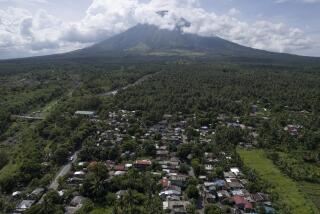With Tears and Hugs, Peace Corps Starts Evacuation : Philippines: Fears of rebel attacks cut short the work of 261 volunteers in one of the organization’s oldest and largest overseas programs.
MANILA — Citing terrorist threats from Communist rebels, the U.S. Peace Corps began evacuating its 261 volunteers from the Philippines on Friday, indefinitely closing one of the oldest and largest overseas Peace Corps programs.
With tears, hugs and a sense of shock, the first 90 volunteers boarded five commercial flights to Hawaii for processing before going home. The others will leave this weekend. Assignments also were canceled for 78 volunteers due to arrive next week.
President Corazon Aquino, whose four-year-old government is beset by a faltering economic recovery and persistent reports of another right-wing military coup attempt, said she was “shocked” by the pullout and asked the United States to reconsider.
But U.S. officials said they are increasingly fearful of threats from the Communist New People’s Army (NPA). In recent weeks, the Bush Administration has given “danger pay” to diplomats and servicemen assigned here, shortened the length of military tours, and offered to repatriate military dependents. At least 210 families asked to be sent home.
Many of the volunteers carried only embroidered tribal bags or well-worn day packs Friday, since most had left their belongings behind in scores of villages when they were suddenly summoned to Manila without explanation early in the week. The pullout was announced Wednesday.
“We’re all stunned,” said Toby Lane, 51, a Reseda resident who left her husband and two grown children a year ago to train math teachers in Tacloban on Leyte Island. “People have been crying for three days.”
“Joining the Peace Corps was something I waited 30 years to do,” she added, sitting on steps outside the Holiday Inn. “Since I was married, it took a year to fight my way in. It’s an awful way to end a 30-year dream.”
“It’s really sad,” said Maria Eisemann, 27, of Portland, Me., who worked in a forestry project in a remote mountain village in northern Luzon. “After 26 months, I didn’t even say goodby to anyone.”
It was unclear when or if the Peace Corps might return. Publicly, the program was “temporarily suspended,” and the Manila office will stay open. But one U.S. official said volunteers are unlikely to return in the foreseeable future.
“The threat isn’t going to go away,” he said. “And there’s no way to protect these people.”
U.S. officials said intelligence sources had intercepted a message to rebel army members that for the first time targeted Peace Corps volunteers, as well as U.S. diplomats and servicemen, for death or kidnaping, as part of the campaign to close six U.S. military facilities here.
“They were planning on moving, and we preempted them,” said one U.S. official. He described the information as “very reliable.”
He said it was not clear if the threat was related to the kidnaping of a Japanese private aid official on the island of Negros last month. But he said the threat indicated that the 21-year-old Communist insurgency is being “widened” to include U.S. civilians.
The rebels have killed six members of the U.S. military in the last 14 months, and recently vowed to kill more Americans until the bases are “kicked out.”
“The NPA seems to be moving more and more toward terrorist activities,” said Stanley Schrager, an embassy spokesman. “Our action is to deny them this group of targets.”
About 7,500 Americans have served in the Peace Corps here, more than in any other country, since President John F. Kennedy created the program in 1961, according to the embassy. They planted new strains of rice, reforested hillsides, built fish ponds, trained teachers and did other work. Most learned at least one language, and often obscure dialects as well.
Amanda Miller, 22, of Warren Township, N.J., spent five months learning Mayoyao, a dialect spoken only in the tiny mountain hamlet of the same name. She had just begun teaching there when an embassy car showed up Monday to take her to Manila.
“If there was danger, I’m glad they got me out,” she said. “But I don’t know.”
Military officials say the NPA has about 19,000 fighters, and many Peace Corps volunteers were assigned to rural areas where rebel influence is strong. But no volunteer has been attacked, and it was difficult to find anyone Friday who had felt in danger.
“It was a tacit understanding between the military, the Communists and the volunteers,” said Fabrice Schneider, 24, who built a medical clinic in his two-year stint in Kalibo Aklan. “Everyone knew who I was. I never felt any danger.”
“I’m angry at the U.S. Embassy, not the Peace Corps,” said Schneider, a native of Alamogordo, N.M. “They won’t even tell us why they pulled us out.”
U.S. officials insisted that the withdrawal did not imply a loss of confidence in Aquino. But the decision apparently caught the Philippine government by surprise and added to strains between Washington and Manila.
Aquino told about 100 volunteers at an emotional farewell ceremony at Malacanang Palace on Thursday that she was “shocked” by the move. Her defense secretary, Fidel V. Ramos, complained that the withdrawal was “rather hasty,” and said the military knew of no threats against the volunteers.
Analysts say the Communist rebellion, once seen as the most serious problem facing Aquino, has been weakened by military assaults, bloody internal purges, and the capture of important figures.
Other Philippine officials complained that the Peace Corp pullout would further hurt attempts to lure foreign investors and tourists to a country battered by six coup attempts, crumbling infrastructure and widespread corruption. About 11 multinational corporations have moved regional headquarters out of Manila since the last coup attempt in December.
Ricardo Romulo, head of the influential Makati Business Club in Manila, said the Philippine image has suffered overseas.
“And this doesn’t help,” he said.
More to Read
Sign up for Essential California
The most important California stories and recommendations in your inbox every morning.
You may occasionally receive promotional content from the Los Angeles Times.











